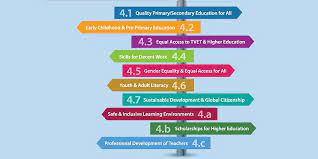Sustainable Development Goal 4: Quality Education
Sustainable Development Goal 4 (SDG 4) focuses on ensuring inclusive and equitable quality education for all. Education is a fundamental human right and a key driver for sustainable development. By achieving SDG 4, we can empower individuals, promote lifelong learning opportunities, and build a more prosperous and peaceful society.
Key Objectives of SDG 4:
- Ensure that all girls and boys have access to free, equitable, and quality primary and secondary education.
- Promote equal access to affordable vocational training, higher education, and technical skills for all.
- Eradicate gender disparities in education and ensure equal access for vulnerable populations.
- Enhance the quality of teaching and learning through professional development for educators.
- Expand educational facilities that are inclusive, safe, and conducive to learning.
- Promote lifelong learning opportunities for people of all ages.
The Importance of SDG 4:
Quality education is essential for breaking the cycle of poverty, fostering economic growth, promoting gender equality, improving health outcomes, and building resilient communities. By investing in education, we can equip individuals with the knowledge and skills needed to address global challenges such as climate change, inequality, and conflict.
Challenges Ahead:
Despite progress in expanding access to education worldwide, many challenges remain. These include inadequate funding for educational systems, disparities in educational quality between urban and rural areas, lack of trained teachers in remote regions, barriers to girls’ education, and limited access to technology for learning.
Take Action:
To achieve SDG 4 by 2030, it is crucial for governments, civil society organisations, businesses, educators, parents, and individuals to work together towards common goals. By advocating for policy changes that prioritise education funding and equity, supporting innovative teaching methods and technologies, promoting lifelong learning initiatives at all levels of society – we can make quality education a reality for everyone.
Understanding Sustainable Development Goal 4: Key Questions and Answers
- What is Sustainable Development Goal 4?
- Why is Quality Education important in the context of Sustainable Development Goal 4?
- How does Sustainable Development Goal 4 aim to ensure equal access to education for all?
- What are the key challenges hindering the achievement of Sustainable Development Goal 4?
- What can individuals and organisations do to contribute to the realisation of Sustainable Development Goal 4?
What is Sustainable Development Goal 4?
Sustainable Development Goal 4, part of the United Nations’ 2030 Agenda for Sustainable Development, aims to ensure inclusive and equitable quality education for all. It recognises education as a fundamental human right and a crucial driver for sustainable development. By focusing on providing access to free, quality primary and secondary education, promoting vocational training opportunities, eradicating gender disparities in education, and enhancing the overall quality of teaching and learning, SDG 4 seeks to empower individuals, promote lifelong learning, and build more prosperous and peaceful societies globally.
Why is Quality Education important in the context of Sustainable Development Goal 4?
Quality Education is paramount in the context of Sustainable Development Goal 4 because it serves as the foundation for achieving all other sustainable development objectives. By ensuring that individuals have access to inclusive, equitable, and high-quality education, we empower them with the knowledge and skills necessary to address global challenges, promote economic growth, foster gender equality, improve health outcomes, and build resilient communities. Quality education not only enhances individual opportunities but also contributes to creating a more prosperous and peaceful society for present and future generations. It is through education that we can instil values of sustainability, critical thinking, and innovation that are essential for achieving a sustainable future for all.
How does Sustainable Development Goal 4 aim to ensure equal access to education for all?
Sustainable Development Goal 4 aims to ensure equal access to education for all by implementing strategies that address barriers to education and promote inclusivity. This goal focuses on providing free, equitable, and quality primary and secondary education for all children, regardless of their background or circumstances. SDG 4 also aims to eradicate gender disparities in education and ensure that vulnerable populations have the same opportunities to access education. By promoting affordable vocational training, higher education, and technical skills for all individuals, this goal seeks to create a level playing field where everyone has the chance to learn and thrive. Through these initiatives, SDG 4 works towards building a more educated, empowered, and equitable society for present and future generations.
What are the key challenges hindering the achievement of Sustainable Development Goal 4?
One of the key challenges hindering the achievement of Sustainable Development Goal 4 is the persistent disparities in access to quality education. Factors such as poverty, gender inequality, lack of infrastructure, inadequate funding, and conflict-affected regions pose significant barriers to ensuring inclusive and equitable education for all. Additionally, the shortage of trained teachers, outdated teaching methods, and limited educational resources further impede progress towards achieving SDG 4. Addressing these challenges requires a collaborative effort involving governments, policymakers, educators, civil society organisations, and communities to implement targeted interventions that promote universal access to quality education and lifelong learning opportunities.
What can individuals and organisations do to contribute to the realisation of Sustainable Development Goal 4?
To contribute to the realisation of Sustainable Development Goal 4, individuals and organisations can take various actions. Individuals can support quality education by advocating for inclusive and accessible learning opportunities in their communities, volunteering as mentors or tutors, promoting literacy programmes, and engaging in lifelong learning themselves. Organisations can invest in educational infrastructure, collaborate with schools and universities to provide resources and expertise, support teacher training initiatives, offer scholarships or sponsorships for underprivileged students, and develop partnerships with government agencies and NGOs to address education inequalities. By working together and prioritising education as a shared responsibility, individuals and organisations can play a crucial role in advancing SDG 4 and ensuring quality education for all.
